A trade union or labor union, often simply referred to as a union, is an organization of workers whose purpose is to maintain or improve the conditions of their employment, such as attaining better wages and benefits, improving working conditions, improving safety standards, establishing complaint procedures, developing rules governing status of employees and protecting and increasing the bargaining power of workers.
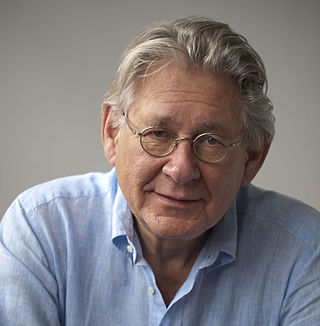
Leo Victor Panitch was a Canadian research professor of political science and a Canada Research Chair in comparative political economy at York University. From 1985 until the 2021 edition, he served as co-editor of the Socialist Register, which describes itself as "an annual survey of movements and ideas from the standpoint of the independent new left". Panitch himself saw the Register as playing a major role in developing Marxism's conceptual framework for advancing a democratic, co-operative and egalitarian socialist alternative to capitalist competition, exploitation, and insecurity.
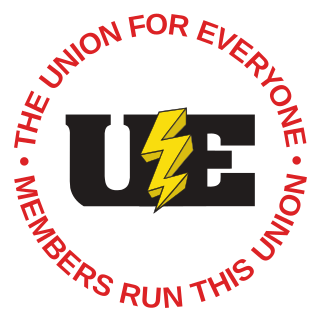
The United Electrical, Radio and Machine Workers of America (UE), is an independent democratic rank-and-file labor union representing workers in both the private and public sectors across the United States.

A strikebreaker is a person who works despite an ongoing strike. Strikebreakers may be current employees, or new hires to keep the organization running. In continuing to work, or taking jobs at a workplace under current strike, strikebreakers are said to "cross picket lines".

Union busting is a range of activities undertaken to disrupt or weaken the power of trade unions or their attempts to grow their membership in a workplace.
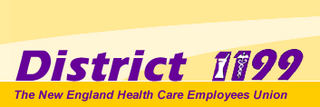
SEIU 1199 New England, also known as the New England Health Care Employees Union, is a local labor union that represents some 29,000 health care providers in the states of Connecticut and Rhode Island. Founded in 1958 in Connecticut with support from 1199 union organizers from New York, the local SEIU 1199 New England has union halls in Hartford, CT and Providence, RI. It is the largest health care workers union in Connecticut.

Sam Gindin is a Canadian intellectual and activist known for his expertise on the labour movement and the economics of the automobile industry.
Labor Notes is an American non-profit organization and network for rank-and-file union members and grassroots labor activists. Though officially titled the Labor Education and Research Project, the project is best known by the title of its monthly magazine. The magazine reports news and analysis about labor activity or problems facing the labor movement. In its pages it advocates for a revitalization of the labor movement through Social Movement Unionism and union democracy. Labor Notes is based out of Detroit, Michigan, with an East Coast office located in Brooklyn, New York.
Card check, also called majority sign-up, is a method for employees to organize into a labor union in which a majority of employees in a bargaining unit sign authorization forms, or "cards", stating they wish to be represented by the union. Since the National Labor Relations Act (NLRA) became law in 1935, card check has been an alternative to the National Labor Relations Board's (NLRB) election process. Card check and election are both overseen by the National Labor Relations Board. The difference is that with card sign-up, employees sign authorization cards stating they want a union, the cards are submitted to the NLRB and if more than 50% of the employees submitted cards, the NLRB requires the employer to recognize the union. The NLRA election process is an additional step with the NLRB conducting a secret ballot election after authorization cards are submitted. In both cases the employer never sees the authorization cards or any information that would disclose how individual employees voted.
The Bituminous coal strike of 1974 was a 28-day national coal strike in the United States led by the United Mine Workers of America. It is generally considered a successful strike by the union.
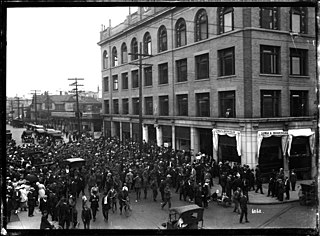
Labor relations or labor studies is a field of study that can have different meanings depending on the context in which it is used. In an international context, it is a subfield of labor history that studies the human relations with regard to work in its broadest sense and how this connects to questions of social inequality. It explicitly encompasses unregulated, historical, and non-Western forms of labor. Here, labor relations define "for or with whom one works and under what rules. These rules determine the type of work, type and amount of remuneration, working hours, degrees of physical and psychological strain, as well as the degree of freedom and autonomy associated with the work." More specifically in a North American and strictly modern context, labor relations is the study and practice of managing unionized employment situations. In academia, labor relations is frequently a sub-area within industrial relations, though scholars from many disciplines including economics, sociology, history, law, and political science also study labor unions and labor movements. In practice, labor relations is frequently a subarea within human resource management. Courses in labor relations typically cover labor history, labor law, union organizing, bargaining, contract administration, and important contemporary topics.
The Employee Free Choice Act is the name for several legislative bills on US labor law which have been proposed and sometimes introduced into one or both chambers of the U.S. Congress.

SEIU Healthcare is a Canadian trade union representing more than 60,000 workers in Ontario, Canada. Through collective bargaining, the union represents workers in hospitals, home care, nursing and retirement homes, and community services. The union has been active in Ontario for over 70 years.

The Blue Eagle at Work: Reclaiming Democratic Rights in the American Workplace is a legal treatise written by Charles J. Morris which analyzes collective bargaining under the National Labor Relations Act (NLRA), the federal statute governing most private sector labor relations in the United States. Published in 2005 by Cornell University Press, the text claims that the NLRA guarantees that employees under that Act have the right to bargain collectively through minority unions—but only on a members-only basis—in workplaces where there is not an established majority union, notwithstanding that the present practice and general understanding of the law is that only majority-union employees are entitled to engage in collective bargaining on an exclusivity basis. Contracts resulting from such minority-union bargaining would apply to union members only, not to other employees.

Jane F. McAlevey was an American union organizer, author, and political commentator. She was a Senior Policy Fellow at the University of California, Berkeley's Institute for Research on Labor and Employment, and a columnist at The Nation.
The Workplace Democracy Act is a proposed US labor law, that has been sponsored by Bernie Sanders and re-introduced from 1992 to 2018. Among its different forms, it would have removed obstacles to employers making collective agreements, established an impartial National Public Employment Relations Commission to support fair collective bargaining, required that pensions plans are jointly managed by employee and employer representatives, changed the definition of an "employee" to ensure every person who works for other people has labor rights, and repeal all "right to work" laws.
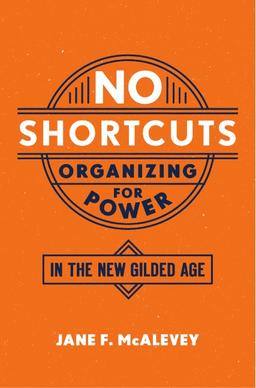
No Shortcuts: Organizing for Power in the New Gilded Age (ISBN 1586480499) is a 2016 non-fiction book by Jane McAlevey, in which the author argues that meaningful social change can only happen when organizing is built around workers and ordinary people at the community level. The book uses case studies from the labor unions and social movements.
Meagan Day is an American writer and editor focusing on class, labor issues, economic inequality, and American politics. She is an editor at Jacobin, where she was previously a staff writer. The author of Maximum Sunlight (2016) and co-author of Bigger than Bernie (2020), her articles have appeared in numerous publications, including The New York Times, The Guardian, and The New Republic. Her work has been cited in articles in The New Yorker, The Hill, The New York Times, and Politico. In 2022, she addressed the Oxford Union on the topic of the American Dream in a global context.
Glacier Northwest, Inc. v. International Brotherhood of Teamsters Local Union No. 174, 598 U.S. 771 (2023) was a decision of the Supreme Court of the United States related to federal labor law, concerning the power of employers to sue labor unions regarding destruction of employer property following a strike. In an 8–1 decision, the Court acknowledged that the right to strike is not absolute, and concluded that the National Labor Relations Act did not preempt lawsuits filed against the union, thus allowing litigation to continue.
The Stamford Organizing Project (SOP) was an experimental multi-trade union coalition in Stamford, Connecticut, launched by the American Federation of Labor and Congress of Industrial Organizations (AFL-CIO) in 1997. Led by labor organizer Jane McAlevey from 1997 to 2001, the project established a collaboration between four unions representing a range of service-sector workers, and worked closely with the community on workplace and community goals, chiefly affordable housing. McAlevey developed her whole-worker organizing model at the SOP.










